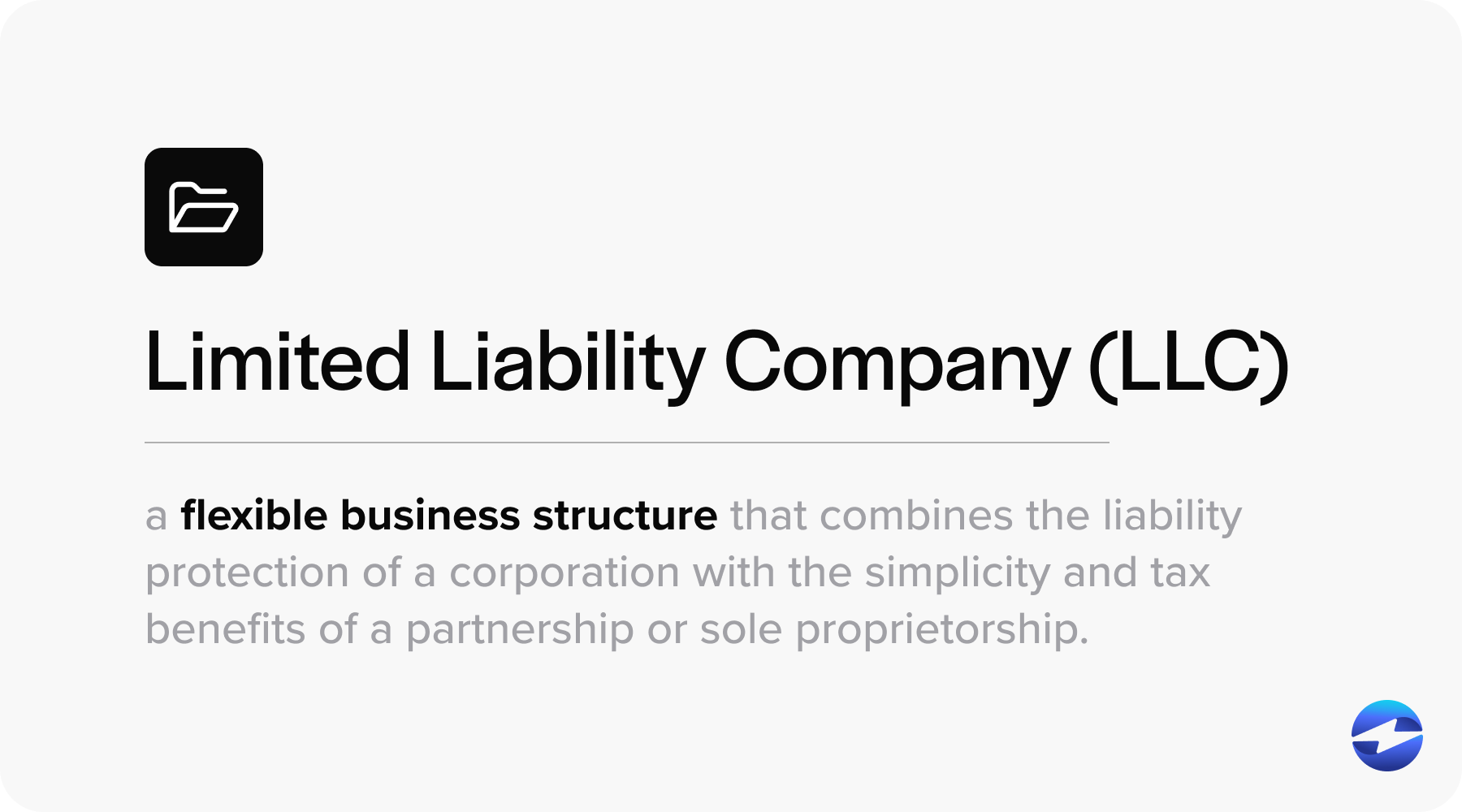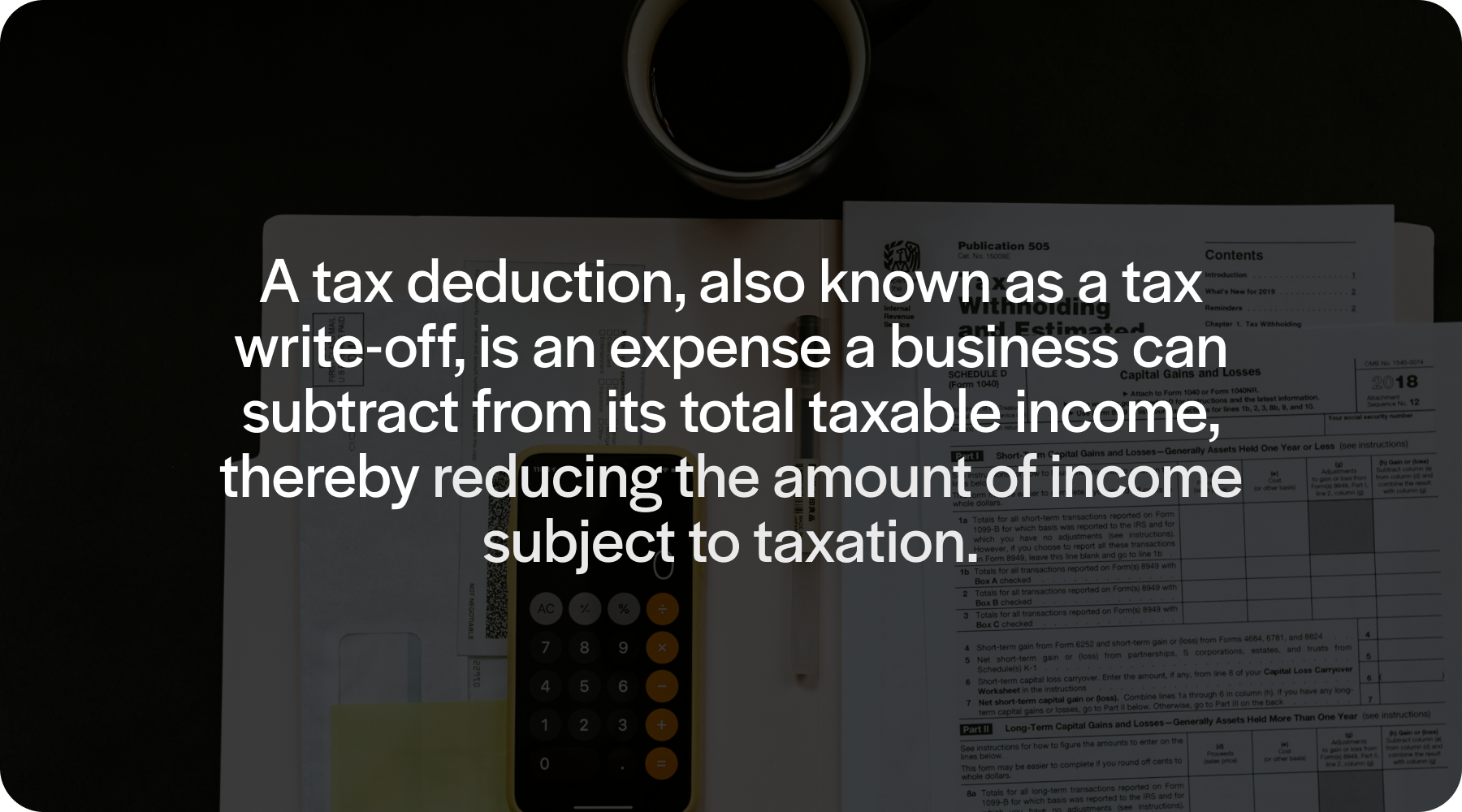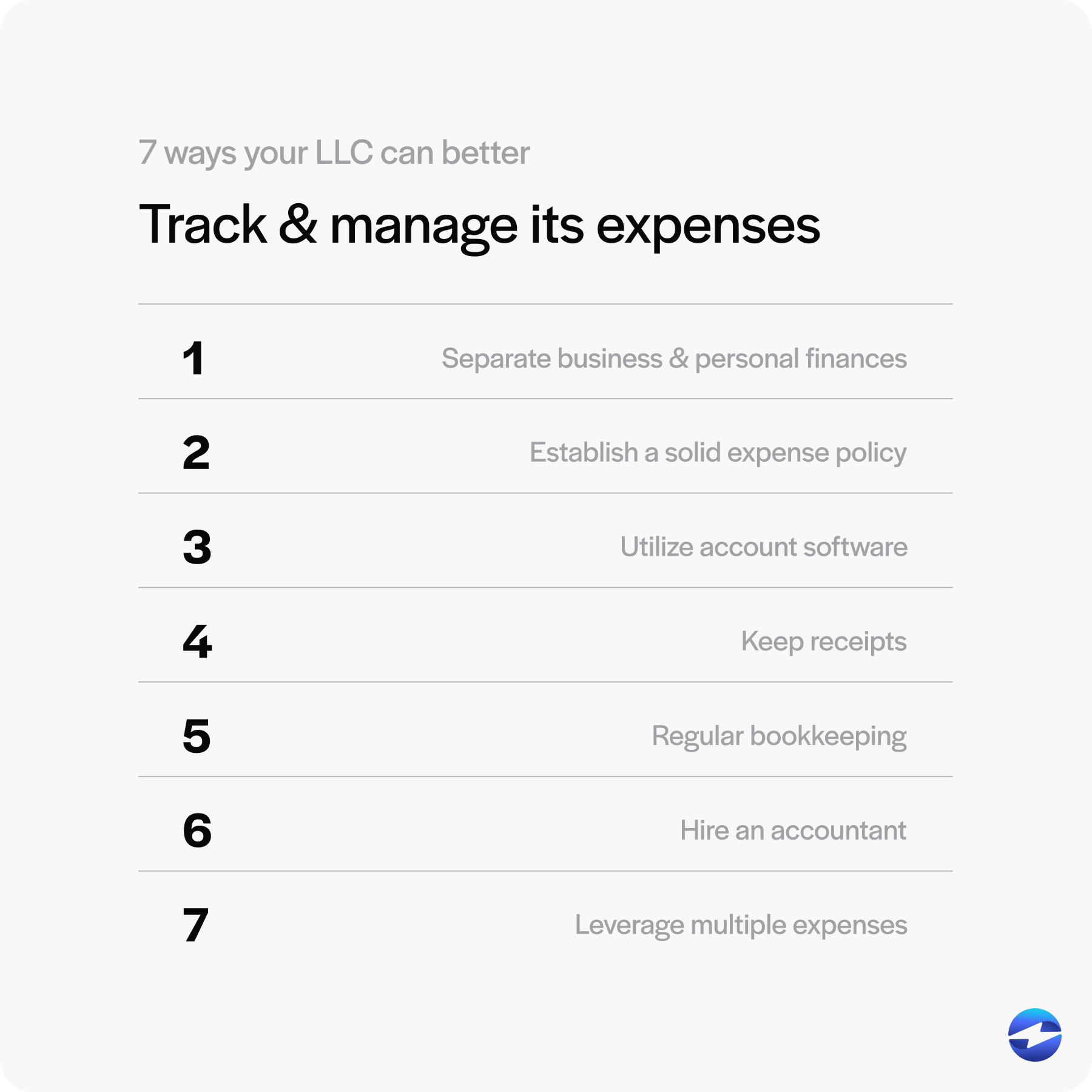Blog > LLC Tax Deductions Explored: 23 Must-Know Write-Offs for Small Businesses
LLC Tax Deductions Explored: 23 Must-Know Write-Offs for Small Businesses
While the world of taxes can feel overwhelming, especially for small businesses, learning how to leverage tax deductions for your Limited Liability Company (LLC) can streamline your finances and maximize your profitability.
Tax deductions can significantly reduce your taxable income, allowing you to reinvest savings back into your business. However, failing to recognize eligible expenses or inadvertently claiming non-deductible items can lead to financial pitfalls.
This article will explore 25 essential LLC write-offs, highlight non-deductible expenses to avoid, and provide tips for effectively managing your business expenses.
What is a Limited Liability Company?
A Limited Liability Company (LLC) is a flexible business structure that combines the liability protection of a corporation with the simplicity and tax benefits of a partnership or sole proprietorship.
LLC owners, known as members, are shielded from personal liability for the company’s debts and obligations, meaning their personal assets are generally protected.

LLCs are popular among small business owners due to their straightforward setup, operational flexibility, and the ability to choose how they are taxed—either as a sole proprietorship, partnership, or corporation. This structure is ideal for entrepreneurs seeking limited liability while maintaining control over their business operations.
Now that you know what an LLC entails, it’s crucial to understand the different tax deductions they can perform.
Understanding tax deductions for LLCs
Managing an LLC offers numerous benefits, including potential tax deductions for business owners.
A tax deduction, also known as a tax write-off, is an expense a business can subtract from its total taxable income, thereby reducing the amount of income subject to taxation. For LLCs, these deductions encompass a wide range of ordinary and necessary business expenses, such as rent, utilities, salaries, and office supplies.

Properly leveraging these deductions can significantly lower your tax liability, improving your company’s profitability. It’s essential to maintain accurate records and consult with a tax professional to ensure compliance with IRS regulations and to maximize the benefits of available deductions.
Now that it’s clear what tax deductions for LLCs can look like, the following section dives into 25 write-offs that small businesses can leverage.
23 write-offs you can use for your small business expenses
Managing finances for your LLC is crucial, especially during tax season, since knowing which expenses you can write off can lower your taxable income and reduce your liability.

Here’s a list of 23 common LLC tax write-offs:
- Office supplies: Paper, pens, printer ink, etc.
- Office space: Rent or home office deductions
- Vehicle expenses: Gas, tolls, parking fees, etc.
- Business meals: Meals with clients
- Startup expenses: Initial business setup costs
- Business cards: Printing and design costs
- Health insurance premiums: Monthly healthcare coverage for you and your staff
- Retirement plan contributions: Funds set aside for employee retirement plans
- Property taxes: Real estate for business operations (offices, warehouses, retail spaces, etc.)
- Office deductions: Utilities, Internet, equipment, etc.
- Business taxes: State and local taxes paid by an LLC (income, payroll, business license taxes, etc.)
- Self-employment tax: The portion of a self-employment tax that covers Social Security and Medicare contributions
- Deductible expenses: Various expenses necessary for standard operations (advertising, travel, office supplies, professional services, etc.)
- Business trips: Travel for work (events, trade shows, meetings, etc.)
- Sole proprietorship losses: Expenses that exceed your income and result in a net operating loss (NOL)
- Business tax return preparation: Accounting fees incurred for preparing your tax return
- Standard deduction: Deductions (mortgage interest, state and local taxes, charitable contributions, medical expenses, etc.) that exceed the standard deduction for your filing status
- Business deduction: Any necessary or ordinary operational expenses commonly accepted in its industry and deemed helpful and appropriate for its trade or infrastructure
- Parking fees: Costs for parking during business-related travel
- Office expenses: Furniture, equipment, etc.
- Advertising costs: Materials and resources (physical and digital) used to promote your business.
- Training and education: Work-related courses and schooling for your staff
- Insurance expenses: Premiums paid for business liability insurance (general liability, professional liability coverage, etc.)
These write-offs can help your LLC maximize its business tax deductions and reduce tax expenses. It’s also important to be aware of the various expenses your LLC can’t deduct for tax purposes.
8 non-deductible expenses to watch out for
Knowing which expenses are non-deductible for tax purposes will help your LLC better manage its finances and limit extra tax charges.

Here are eight everyday non-deductible expenses to watch out for:
- Personal expenses: Any costs unrelated to the business, such as personal grocery bills or clothing, can’t be deducted.
- Commuting costs: Costs related to commuting can’t be deducted.
- Political contributions: Donations to political campaigns or parties aren’t deductible business expenses.
- Penalties and fines: Any fines or penalties paid to the government are non-deductible.
- Gifts that exceed $25: Businesses can’t deduct items or services over $25, even if they’re gifted to employees, clients, partners, suppliers, or even customers.
- Living expenses: Costs incurred for living, such as rent or utilities at a home office, must be strictly segregated from business expenses.
- Social entertainment: Despite being able to write off most meals during company outings, entertainment activities (even if they involve employees, clients, customers, and partners) may not be deductible.
- Charitable donations: Despite donating cash or property to qualified charities (religious, educational, social, etc.), these donations may not be able to be written off entirely. However, individuals may be able to claim them on personal tax returns if they’re itemized.
| Non-Deductible Expense | Description |
|---|---|
| Personal Expenses | Not related to business activities |
| Political Contributions | Donations to political causes |
| Penalties and Fines | Payments for breaking laws or regulations |
| Living Expenses | Personal living costs outside business use |
| Social Entertainment | Excessive entertainment expenses |
| Charitable Donations | Donating to charities |
Other non-deductible expenses include insurance premiums, childcare, and household services and supplies.
Since identifying these expenses will help your LLC reduce errors on its tax return, it’s wise to consult and work with a tax professional to pinpoint which expenses can or can’t be written off.
Now that you’re aware of the items and services your business can and can’t deduct from its taxes, you can learn how to better manage and monitor your expenses.
7 ways your LLC can better track and manage its expenses
For the most optimal financial standing and growth, LLCs should proactively monitor and oversee their expenses.

Here are seven ways your LLC can effectively manage and track its finances:
- Separate business and personal finances: Open a dedicated business bank account to make expense tracking easy.
- Establish a solid expense policy: An expense policy defines approved purchases, spending limits, and the approval process and can be easily created using a template. Additionally, a reimbursement policy ensures employees understand the procedure for recouping personal funds for business expenses. Depending on your business needs, you may also benefit from implementing specific policies for travel expenses and corporate credit card usage.
- Utilize accounting software: Accounting systems like QuickBooks, Microsoft Dynamics, NetSuite, EBizCharge, and many others can help you maintain accurate records and simplify your business tax return filings.
- Keep receipts: It’s essential to save all digital and paper receipts since they can be used as evidence to grant tax deductions for various expenses.
- Regular bookkeeping: LLCs should update their financial records weekly to avoid last-minute stress and unorganized data.
- Hire an accountant: With the help of an accounting professional, your LLC can minimize its tax liability and uncover potential tax write-offs.
- Leverage multiple expenses: Along with categorizing expenses as deductible or non-deductible, businesses can also classify them as recurring or one-time and fixed or variable. One-time expenses, like purchasing equipment, occur once, while recurring expenses, such as subscriptions, repeat regularly. Fixed expenses, like rent, remain consistent, while variable expenses, such as utility bills, fluctuate based on usage. Using these categories helps you analyze spending more effectively and identify areas to reduce costs.
Connecting your payment processing directly to your accounting software can automate much of this tracking. A QuickBooks credit card integration automatically posts every customer payment to the correct invoice, so your records are always up to date when tax season arrives. For LLCs using Sage, a Sage payment integration does the same by syncing payment data to your accounting system in real time. Both options help ensure your deductible expenses are accurately captured without relying on manual entry.
By following these steps, your business can better track its expenses to be set up for success.
5 common mistakes to avoid when claiming deductions
While claiming tax deductions can save money, there are several common mistakes your business should be aware of to avoid increasing its tax liability and errors.
Here are five common mistakes to avoid when claiming deductions:
- Inaccurate categorization: Misclassifying expenses can lead to lost deductions, so properly categorizing expenses is essential. For example, understanding the difference between an office supply or office space cost.
- Ignoring small deductions: Pay attention to minor expenses like parking fees or business cards, as they can add up over time.
- Incorrect vehicle expense calculations: Businesses should use actual costs or standard mileage rates but not mix them. The standard mileage rate simplifies record-keeping by allowing a deduction based on miles driven, while the actual expenses method requires detailed tracking of all vehicle-related costs.
- Overlooking startup costs: LLCs can deduct up to $5,000 in startup expenses, so recording initial business expenditures can be very beneficial.
- Neglecting home office deductions: If you work from home, you may qualify for deductions on office space.
| Common Mistake | Solution |
|---|---|
| Inaccurate Categorization | Understand Expense Types |
| Ignoring Small Deductions | Track Everything |
| Incorrect Vehicle Calculations | Choose One Calculation Method |
| Overlooking Startup Costs | Can Deduct Up to $5,000 |
| Neglecting Home Office Deductions | Deduct Office Space |
Avoiding these mistakes will allow your company to manage its expenses better.
In addition to improving outgoing expense management, merchants can look to reliable payment processing providers like EBizCharge to enhance incoming customer payments.
How LLCs can enhance cash flow with tax write-offs
LLCs should understand and use tax deductions to maximize profitability and streamline financial management.
By leveraging numerous write-offs, pinpointing non-deductible expenses, working with tax professionals, and implementing effective expense tracking strategies, your business can minimize tax liability and enhance operational efficiency to navigate tax seasons and generate the most growth.


